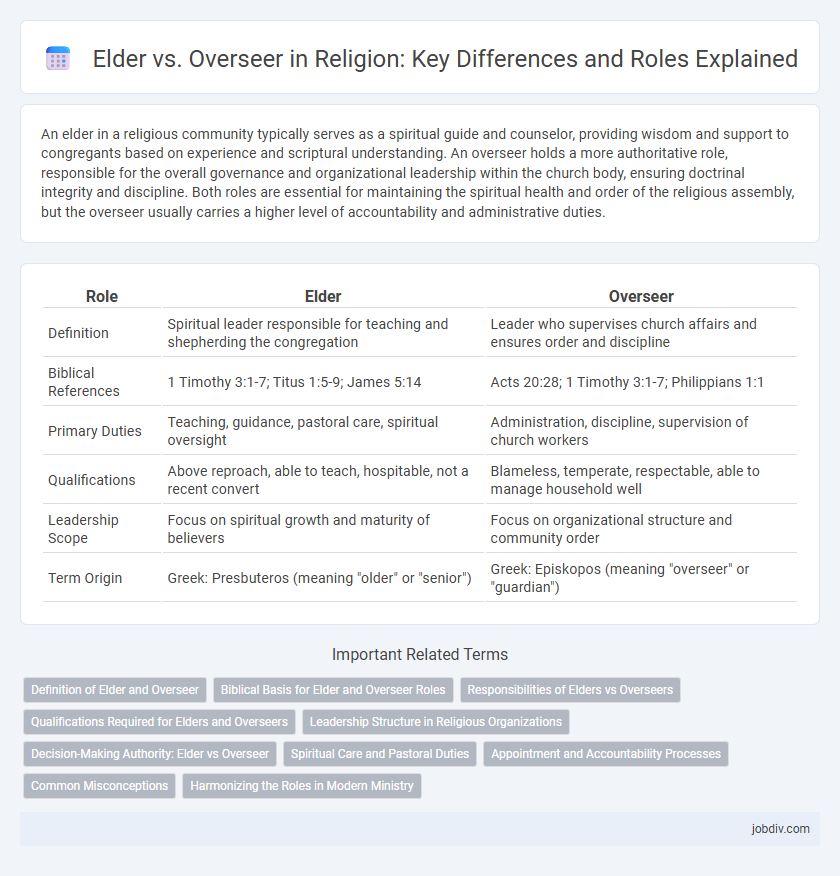An elder in a religious community typically serves as a spiritual guide and counselor, providing wisdom and support to congregants based on experience and scriptural understanding. An overseer holds a more authoritative role, responsible for the overall governance and organizational leadership within the church body, ensuring doctrinal integrity and discipline. Both roles are essential for maintaining the spiritual health and order of the religious assembly, but the overseer usually carries a higher level of accountability and administrative duties.
Table of Comparison
| Role | Elder | Overseer |
|---|---|---|
| Definition | Spiritual leader responsible for teaching and shepherding the congregation | Leader who supervises church affairs and ensures order and discipline |
| Biblical References | 1 Timothy 3:1-7; Titus 1:5-9; James 5:14 | Acts 20:28; 1 Timothy 3:1-7; Philippians 1:1 |
| Primary Duties | Teaching, guidance, pastoral care, spiritual oversight | Administration, discipline, supervision of church workers |
| Qualifications | Above reproach, able to teach, hospitable, not a recent convert | Blameless, temperate, respectable, able to manage household well |
| Leadership Scope | Focus on spiritual growth and maturity of believers | Focus on organizational structure and community order |
| Term Origin | Greek: Presbuteros (meaning "older" or "senior") | Greek: Episkopos (meaning "overseer" or "guardian") |
Definition of Elder and Overseer
An Elder in a religious context is typically a mature, spiritually experienced member entrusted with teaching, guiding, and shepherding the congregation. An Overseer, often synonymous with Bishop in Christian traditions, holds a leadership role responsible for supervising church affairs, maintaining doctrinal purity, and ensuring the welfare of the community. Both positions emphasize pastoral care and governance but differ slightly in scope, with Overseers having broader administrative authority.
Biblical Basis for Elder and Overseer Roles
The biblical basis for elder and overseer roles centers on passages such as 1 Timothy 3:1-7 and Titus 1:5-9, which outline qualifications emphasizing character, teaching ability, and leadership within the church. Elders and overseers are often seen as interchangeable terms in the New Testament, both referring to spiritual leaders responsible for shepherding and governance in the community, as indicated in Acts 20:17-28 and 1 Peter 5:1-4. Scriptural emphasis on accountability, maturity, and sound doctrine highlights the essential function these roles serve in maintaining church order and spiritual health.
Responsibilities of Elders vs Overseers
Elders primarily oversee spiritual guidance, teaching, and shepherding the congregation, ensuring doctrinal accuracy and nurturing faith development. Overseers carry a broader responsibility that includes administrative leadership, organizational management, and maintaining church discipline alongside spiritual oversight. Both roles collaborate to uphold church order, but elders emphasize pastoral care while overseers focus on governance and operational duties.
Qualifications Required for Elders and Overseers
Elders and overseers must exhibit qualities such as being above reproach, self-controlled, and hospitable, demonstrating strong faith and moral integrity. They should manage their households well, not be recent converts, and hold a good reputation within the community to ensure effective spiritual leadership. Teaching ability and the ability to encourage sound doctrine are essential qualifications distinguishing elders and overseers in their pastoral responsibilities.
Leadership Structure in Religious Organizations
Elders and overseers serve distinct roles in the leadership structure of many religious organizations, with elders often providing spiritual guidance and oversight through collective wisdom, while overseers hold responsibility for administrative governance and organizational discipline. The elder body typically functions as a council ensuring doctrinal integrity and pastoral care, whereas overseers execute operational decisions and maintain church order. Effective leadership structures balance the elder's counseling authority with the overseer's executive duties to sustain congregational health and growth.
Decision-Making Authority: Elder vs Overseer
Elders hold significant decision-making authority within religious communities, often bearing responsibility for doctrinal guidance and community discipline. Overseers, while also playing a leadership role, typically focus on administrative duties and the practical oversight of congregation activities. The distinction lies in elders providing spiritual direction and final judgments, whereas overseers implement these decisions and maintain organizational order.
Spiritual Care and Pastoral Duties
Elders and overseers both play vital roles in spiritual care and pastoral duties, ensuring the well-being and growth of the congregation. Elders primarily provide spiritual guidance, prayer support, and mentorship to church members, fostering a nurturing environment for faith development. Overseers focus on supervising church operations, maintaining doctrinal integrity, and coordinating ministry activities to support the elders' pastoral responsibilities effectively.
Appointment and Accountability Processes
Elders are appointed through a congregational nomination followed by a formal approval process driven by senior leadership, emphasizing spiritual maturity and proven ability to teach and shepherd. Overseers undergo a similar selection procedure but are held to higher accountability standards, often involving regular evaluations by a governing body to ensure adherence to doctrinal integrity and administrative responsibilities. Both roles require ongoing commitment to biblical qualifications, with elders focusing on local congregation care while overseers maintain broader supervisory oversight.
Common Misconceptions
Elders and overseers are often mistakenly thought to hold distinct hierarchical roles, but in many Christian traditions, these terms describe the same office responsible for spiritual oversight and leadership within the congregation. The New Testament uses "elder" (presbyteros) and "overseer" (episkopos) interchangeably, emphasizing their shared function rather than separate authority levels. Misconceptions arise when congregations interpret these titles through modern organizational structures rather than biblical context, leading to confusion about their responsibilities and unity in church governance.
Harmonizing the Roles in Modern Ministry
Elders and overseers both serve crucial leadership roles in modern ministry, with elders often providing spiritual guidance and pastoral care, while overseers focus on organizational oversight and maintaining church order. Harmonizing these roles involves clear communication, shared responsibilities, and mutual respect to ensure effective governance and spiritual growth within the congregation. This balance supports a cohesive ministry that upholds biblical principles and meets contemporary church needs.
Elder vs Overseer Infographic

 jobdiv.com
jobdiv.com